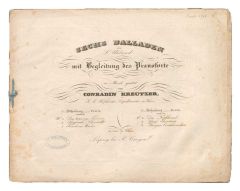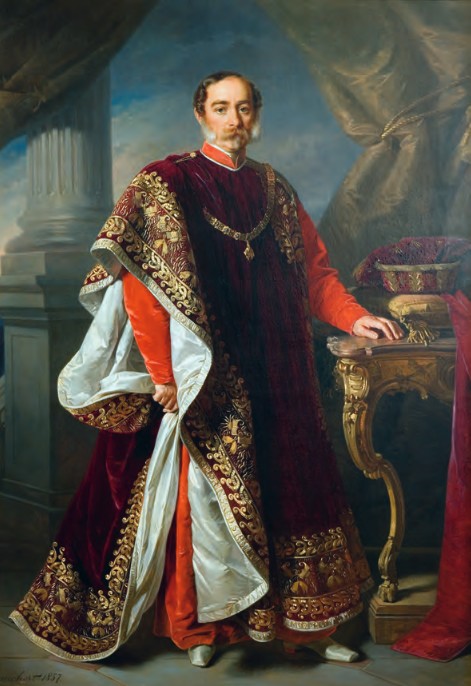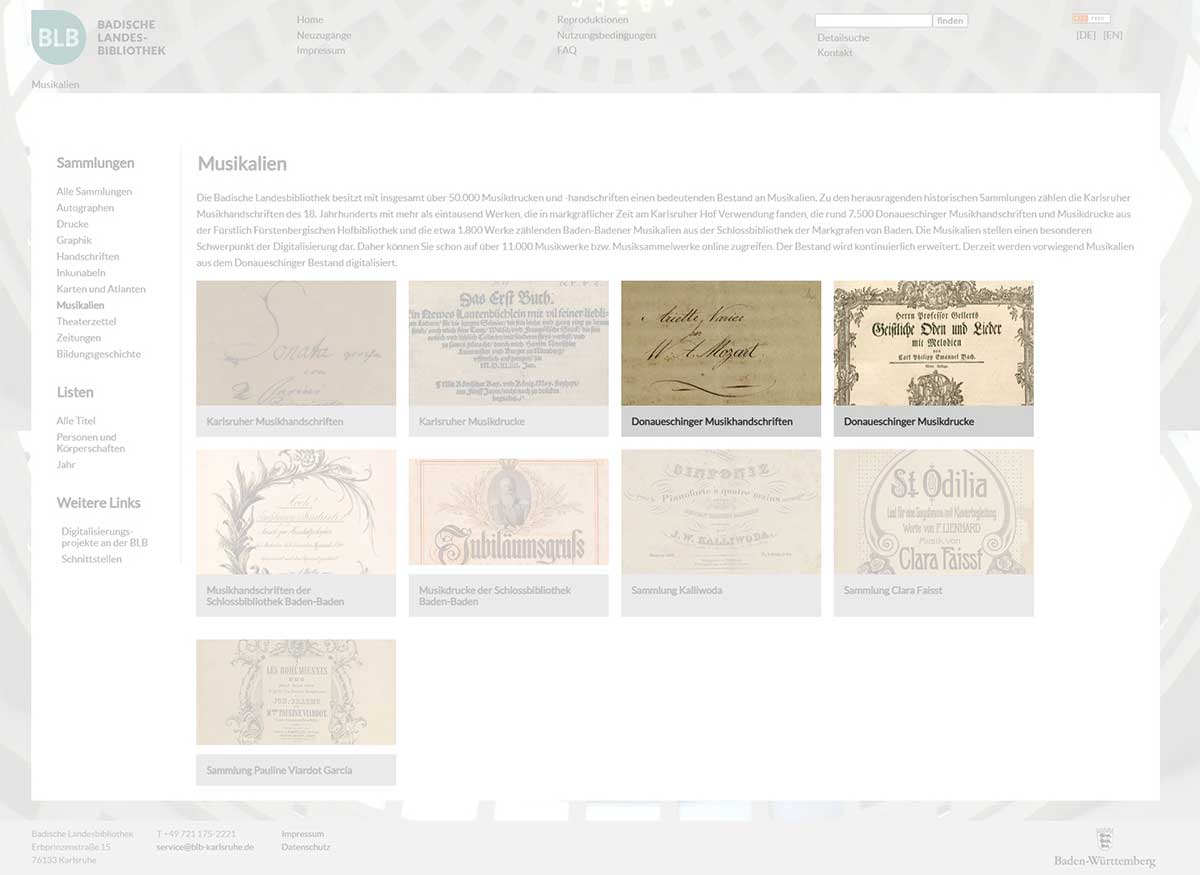Music prints and manuscripts from the Donaueschingen court library now fully accessible online
Thursday, November 6, 2025

The following text by Gerrit Heim first appeared on BLBlog and is reprinted here with kind permission.
With the music archive, the government of Baden-Württemberg purchased yet another valuable collection from the Princely Fürstenberg Court Library in Donaueschingen in 1999. The acquisition was primarily funded by the Baden-Württemberg Cultural Heritage Foundation and the Cultural Foundation of the German Federal States. The music collection, which has been taken over almost completely, consists of more than 5,300 printed music editions and over 3,500 music manuscripts. The significance of this acquisition is evident from a brief look at the catalog of an exhibition dedicated to the collection by the Badische Landesbibliothek in 2000.
In his foreword to this catalog, Klaus von Trotha, then Minister of Science, Research, and the Arts in Baden-Württemberg, wrote: “With the music collection of the Princely Fürstenberg Court Library, which – due to its wholeness and well-balanced mixture of virtually all musical genres – is an important evidence for the cultivation of music at a regionally significant court in the second half of the 18th and the first half of the 19th centuries, the Badische Landesbibliothek acquires an exquisite addition to its significant music collection.”
This outstanding music collection also left a mark on the strategy of the digitization center which the Badische Landesbibliothek opened in 2010. The digitization of musical sources has been a priority for the Badische Landesbibliothek for 15 years. Over this period, a series of projects have generated approximately 600,000 images from the music collection. Subprojects related to various aspects of the Donaueschingen music archive were standard project components throughout these years, each of them funded by the Baden-Württemberg Cultural Heritage Foundation. Between 2016 and 2021, four digitization projects targeted the music manuscripts. Subsequently, three further projects digitizing the printed music editions were successfully completed.
The Donaueschingen collection contains many works by important composers that are of great value for researchers of the history of music and theater in the state of Baden-Württemberg. From the middle of the 18th to the middle of the 19th centuries, the musical repertoire of the court showed great variety, encompassing symphonies, concertos, operas, overtures, melodramas, ballets, dances, Harmoniemusik, chamber music, and church music. Court music in Donaueschingen flourished in particular under the princes Joseph Wenzel zu Fürstenberg, Joseph Maria Benedikt zu Fürstenberg, and Carl Egon II zu Fürstenberg.
In accordance with this, the digitized sources cover an astonishing range, including works by such prominent figures as Wolfgang Amadé Mozart, whose operas were all performed also in Donaueschingen. The court of the Princes Fürstenberg had close ties to Prague and Vienna, and obtained copies of Mozart’s works from there. In addition, the collection includes works by court conductors Conradin Kreutzer (1780–1849) and Johann Wenzel Kalliwoda (1801–1866).
Many traveling artists frequented the music-loving court in Donaueschingen, whose princes were known to be generous toward musicians. A particular highlight was Franz Liszt’s (1811–1886) visit in 1843: the famous pianist and composer spent three days in Donaueschingen, giving several concerts at the court. According to a contemporary report, his playing moved his listeners to tears. It is therefore not surprising that printed editions of Liszt’s works have also survived in the Donaueschingen music collection.
Recently, there has been growing interest in the works of female composers, as well as their biographies, the conditions under which they lived and the opportunities they had throughout their creative career. The digitization of the Donaueschingen music collection provides an opportunity to make such compositions available not only for academic research, but also for musical performance and new editions. A case in point is the Bielefeld-born composer Sophie Crüwell (1826–1907), better known under her stage name Sophie Cruvelli. She was one of the most famous opera singers in Europe in the mid-19th century, who reached the peak of her career in France. In 1854, the Grand Opera in Paris offered her a two-year contract for a salary that no prima donna had ever received before. Once this contract expired, Sophie Crüwell promptly retired from the stage and married Count George Vigier. From 1858 onwards, charity concerts allowed her to return to the stage, mainly at her winter residence in Nice, where the international society gathered every year. However, it is relatively little known that Sophie Crüwell also composed music: L’ etoile que j’aime – paroles et musique de Sophie Cruvelli is now available in the digital collections of the Badische Landesbibliothek. The work was published in 1860 by Ménestrel in Paris and, according to the K10plus union catalog, the copy owned by the Badische Landesbibliothek is the only one surviving in Germany.
As with many aristocratic music collections of the 19th century, the Donaueschingen archive also contains compositions by peers of the Princes of Donaueschingen, including works from the House of Fürstenberg itself. Noteworthy in this context are the works by Emil Egon zu Fürstenberg (1825–1899), son of the ruling Prince Karl Egon II zu Fürstenberg and his wife Amalie Princess of Baden. Emil Egon published numerous compositions under the pseudonym Emil (von) Urach. His works that have been digitized as part of this project of the Badische Landesbibliothek have so far been found only in this collection.

Image 2: Karl Egon II, Prince of Fürstenberg, from Schwäbische Heimat 2018 (4), p. 431, CC-BY 4.0
While browsing among the printed music editions, one can come across rare works such as the Defilir March for four hands by Alexandra von Sachsen-Altenburg (1830–1911). Alexandra came from a Sachsen-Altenburg-Württemberg family and became a Russian grand duchess through marriage in 1849. She was a talented musician, and several of her compositions have been preserved. Together with her sisters Marie, Therese, and Elisabeth, she had been a student of Carl Ludwig Nietzsche. The Defilier-Marsch, digitized as part of the current project, has so far only been found in the Badische Landesbibliothek.

Image 3: Donaueschinger Musikalien in the Digital Collections of the Badische Landesbibliothek.
The complete Fürstenberg collection of music manuscripts and printed editions can now be viewed and searched in the digital collections of the Badische Landesbibliothek, with the option to download the files. A total of 230,000 images of music manuscripts and 165,000 images of printed music from the holdings of the collection have been made available digitally.
The best place to start is arguably the music collection, where the sources are ordered in categories. Alternatively, you can perform an advanced search in the music collection. Once you have found the music you are looking for, you can open it with the integrated IIIF viewer, view the source in full-screen mode, or download the file in PDF or JPG formats.
Almost all the titles are also findable in RISM (RISM Catalog | RISM Online) and in the Deutsche Digitale Bibliothek.
Image 1 (above): Six Ballads by Ludwig Uhland set to music by Conradin Kreutzer.
Share Tweet EmailCategory: Library collections

